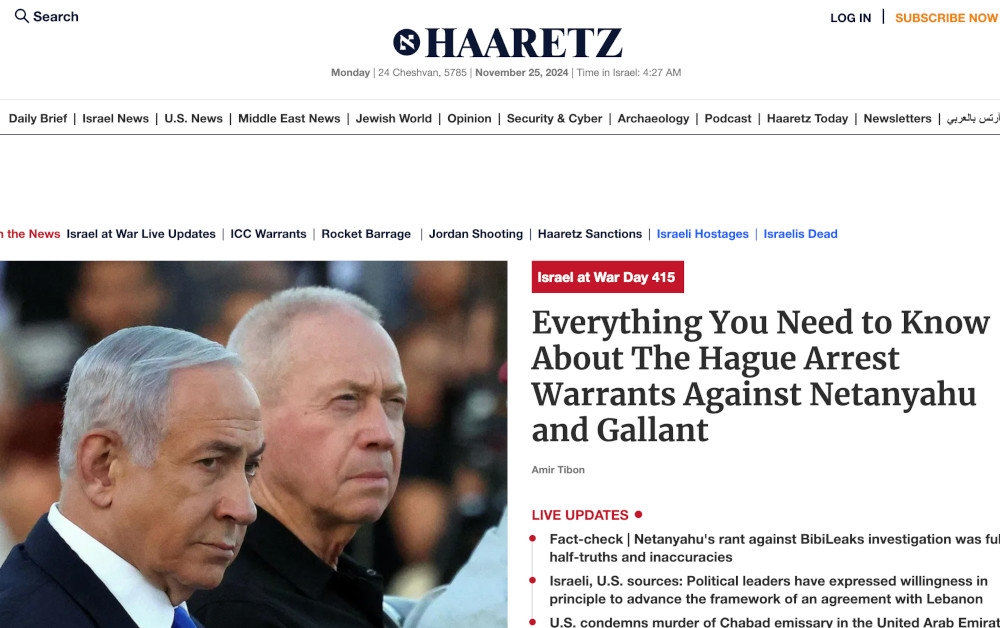The Israeli government has passed an order to sever all ties between government-financed bodies and the newspaper Haaretz. The order calls for communications to cease and advertising to stop in the newspaper following its latest critiques of the Israeli state and government leaders.
Boycott Order Amid Criticism
On Sunday, the Israeli government approved a proposal to stop all official dealings with Haaretz in response to what the officials described as repeated criticisms of Israel’s legitimacy and its right to defend itself, particularly comments from Haaretz publisher Amos Schocken. In a recent conference in London, Schocken called Palestinian militants “freedom fighters” and urged that economic sanctions be applied on the Israeli government.
The proposal, discussed at the last minute and endorsed by Prime Minister Benjamin Netanyahu, was added to the cabinet meeting agenda without a prior legal review by the attorney general’s office.
Haaretz: The Response of the Government to the Boycott
Following the government’s decision, Haaretz stated the directive, one that branded Netanyahu for trying to silence independent journalism. “The opportunist resolution to boycott Haaretz, which passed in today’s government meeting without any legal review, is another step in Netanyahu’s journey to dismantle Israeli democracy,” the statement read. The newspaper considered Netanyahu’s move a feature common among stern authoritarian leaders like Vladimir Putin and Recep Tayyip Erdogan.
Haaretz added that it wouldn’t cave into pressure and would continue operating as an independent news outlet. “Haaretz will not baulk and will not morph into a government pamphlet that publishes messages approved by the government and its leader,” the publication said.
More:Tech Innovations Transforming 2024: AI, Renewable Energy, and Robotics.
Schocken’s Controversial Remarks and Clarification
The row over Haaretz reached new proportions following Amos Schocken’s speech on 1 November in London. Schocken was highly critical in his remarks of the Israeli government’s policies towards the Palestinians and described the present regime as an “apartheid” state. When he made attacks against the Palestinian “freedom fighters,” he was attacked for these comments, leading Schocken to clarify that he did not believe Hamas to be a freedom fighter and that he fully endorsed non-violent action.
Despite this clarification, Haaretz followed up with an editorial condemning Schocken’s remarks, saying that Schocken’s apology did not go far enough in denouncing attacks by various Palestinian groups.
Restrictions by the Government on Haaretz
Regarding Schocken’s statements, Communications Minister Shlomo Karhi took the lead in the boycott call, publishing an official bill outlining many prohibitions. The order, endorsed on Sunday, includes the prohibition of any government ministry from signing new contracts with Haaretz; further, their existing agreements are not to be extended. Finally, all subscriptions to Haaretz for state employees must be cancelled “as possible under the law.”
The Government Advertising Agency was also instructed to stop all advertisements in Haaretz, including statutory notices. The agency will seek refunds for any pre-paid advertisements and has been directed not to place any further advertisements in the publication, regardless of payment agreements.
Impact on Media and Democracy
The Israeli government’s wide boycott of Haaretz newspaper has brought about debate among Israelis on the total freedom of the press and the limits of criticism of the government. The pro-arguments are that the newspaper undermined the state’s image and security, while the anti-arguments depict it as a direct attack on democratic principles and the independence of the media.
As tensions between the Israeli government and Haaretz continue, the directive raises questions about the balance between national security concerns and the role of a free press in holding power to account. The controversy is expected to intensify as the Israeli and international media closely monitor the implications of this unprecedented government decision.















